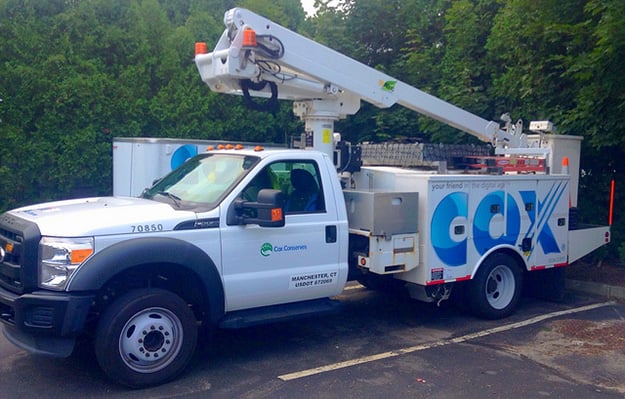Buzzkill: Cox Communications Expands 1TB Data Cap To More Markets, Preps Unlimited Tier
Brace yourselves, Arizona residents—if you receive broadband Internet service from Cox Communications, you are about to be hit with a 1-terabyte data cap. Arizona is one of four new locations where the Internet service provider is expanding its 1TB data cap, bringing the total number of territories with a data limit to 13. Customers in Louisiana, Las Vegas, and Oklahoma are the other three.
"To help our customers in the Arizona, Louisiana, Las Vegas, and Oklahoma service areas get accustomed to this change, we are providing a grace period for two consecutive bill cycles (about 60 days) before we begin charging for additional blocks," Cox Communications said.
The grace periods starts with data usage cycles that begin on July 6, 2017. During that time, customers who exceed their data allotment will be shown the applicable charge on their bill statement, along with a corresponding credit to offset the charge. Starting with bills dated October 8, 2017 and later, Cox Communications will no longer issue grace period credits to customers who go over 1TB.
To be fair, 1TB is a lot of data. However, we have long been opposed to charging for an abstract resource, especially as the market shifts towards 4K video feeds and streaming in general. Whether it is downloading games or watching movies on Netflix, everything is done on the cloud these days. Saddling users with data caps is counterproductive to this cloud-based movement.
Customers who live in areas where there is a data cap will be charged $10 for every 50GB of additional data consumed over their cap. On the bright side, Cox Communications said it will not throttle download speeds, so at least its customers do not have to worry about that.
So what does a 1TB data cap translate into? Consumer Reports notes that a U.S. household is still several years away from being affected, at least generally speaking. In terms of online video viewing, a high definition video stream on Netflix consumes about 3GB per hour. That means you would have to stream 416 videos, each 90 minutes in length, to hit the 1TB data cap.
Things get a little tighter when making the jump to 4K. Streaming content in 4K can eat up 7GB to 10GB of data per hour, which equates to 100 hours of 4K movies and TV shows each month, or 3.33 hours per day.
The problem with those stats is they only take into account video streaming. If you were to download Resident Evil 7: Biohazard from Steam, you'd eat up more than 27GB of data right off the bat. Factor in other online activities and multiple people sharing a single Internet connection in a household, and suddenly that 1TB cap does not seem quite as large.
To Cox Communications' credit, it is planning to offer a new unlimited data plan sometime later this year, according to MultiChannel News. However, it has not yet announced pricing or availability. As a point of reference, Comcast offers an optional unlimited data plan for an additional $50 per month in markets where data caps exist.
Thumbnail Image Source: Cox Communications
"To help our customers in the Arizona, Louisiana, Las Vegas, and Oklahoma service areas get accustomed to this change, we are providing a grace period for two consecutive bill cycles (about 60 days) before we begin charging for additional blocks," Cox Communications said.
The grace periods starts with data usage cycles that begin on July 6, 2017. During that time, customers who exceed their data allotment will be shown the applicable charge on their bill statement, along with a corresponding credit to offset the charge. Starting with bills dated October 8, 2017 and later, Cox Communications will no longer issue grace period credits to customers who go over 1TB.
To be fair, 1TB is a lot of data. However, we have long been opposed to charging for an abstract resource, especially as the market shifts towards 4K video feeds and streaming in general. Whether it is downloading games or watching movies on Netflix, everything is done on the cloud these days. Saddling users with data caps is counterproductive to this cloud-based movement.
Customers who live in areas where there is a data cap will be charged $10 for every 50GB of additional data consumed over their cap. On the bright side, Cox Communications said it will not throttle download speeds, so at least its customers do not have to worry about that.
So what does a 1TB data cap translate into? Consumer Reports notes that a U.S. household is still several years away from being affected, at least generally speaking. In terms of online video viewing, a high definition video stream on Netflix consumes about 3GB per hour. That means you would have to stream 416 videos, each 90 minutes in length, to hit the 1TB data cap.
Things get a little tighter when making the jump to 4K. Streaming content in 4K can eat up 7GB to 10GB of data per hour, which equates to 100 hours of 4K movies and TV shows each month, or 3.33 hours per day.
The problem with those stats is they only take into account video streaming. If you were to download Resident Evil 7: Biohazard from Steam, you'd eat up more than 27GB of data right off the bat. Factor in other online activities and multiple people sharing a single Internet connection in a household, and suddenly that 1TB cap does not seem quite as large.
To Cox Communications' credit, it is planning to offer a new unlimited data plan sometime later this year, according to MultiChannel News. However, it has not yet announced pricing or availability. As a point of reference, Comcast offers an optional unlimited data plan for an additional $50 per month in markets where data caps exist.
Thumbnail Image Source: Cox Communications


